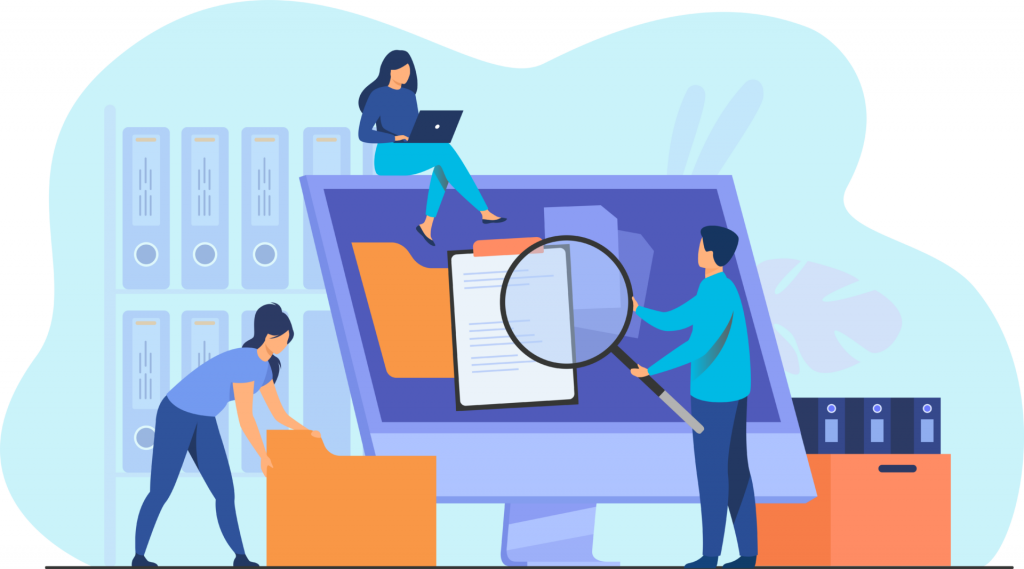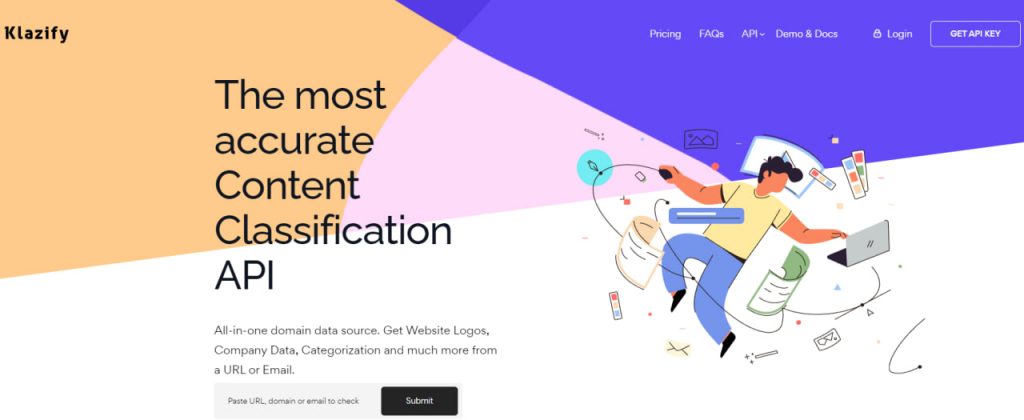In today’s data-driven world, managing and processing vast amounts of information has become a significant challenge for businesses. With the exponential growth of data, it is increasingly difficult to manually classify and organize data into relevant categories. This is where data classification APIs come in handy.
Data classification APIs are software tools that can automatically categorize digital content based on its topic, tone, and other factors. These tools use a combination of natural language processing (NLP) and machine learning (ML) algorithms to identify the main topics and themes present in a piece of content.
One such API in this field that has gained popularity recently is Klazify. This API provides an easy-to-use interface that can be integrated into various applications and websites to automatically categorize content. It uses advanced ML algorithms to accurately identify the topic and tone of a piece of content.

What Are The Benefits Of Using This API?
Klazify can help organizations to extract valuable insights from large amounts of data. By categorizing content, businesses can identify trends and patterns in their industry, monitor competitors, and make informed decisions about their marketing strategies. Here are 5 benefits that this API brings to the table:
- Improved Data Quality: With the ability to automatically classify data based on its content, businesses can ensure that their data is correctly organized and categorized. This can help improve data accuracy and reduce errors, leading to better decision-making and increased efficiency.
- Increased Efficiency: Instead of manually sorting through vast amounts of data, businesses can leverage the power of Klazify to automate the process. This can save a significant amount of time and resources, allowing employees to focus on more critical tasks.
- Better Security: Data security is a crucial concern for businesses today. By classifying data based on its content, businesses can ensure that sensitive information is appropriately handled and protected. Klazify can automatically detect and classify sensitive data, such as personally identifiable information (PII) or financial data, and apply appropriate security measures to protect it.
- Improved Compliance: By using a data classification API like Klazify, businesses can ensure that their data is appropriately classified according to regulatory requirements. This can help avoid costly fines and legal issues and ensure that the business remains compliant with relevant regulations.
- Better Insights: Finally, Klazify can help businesses gain better insights into their data. By classifying data based on its content, businesses can analyze and interpret data more effectively, leading to better insights and decision-making. This can help businesses identify trends, patterns, and opportunities that they may have otherwise missed.
How Does Klazify Work?
Klazify is at its core a content classification API, and it has several dedicated endpoints to perform accurate queries on several fields. The API is tailored to provide a plethora of data about any company with an online presence
Here’s an example of the resulting endpoint after retrieving a company’s data with the API, all it takes is the company’s URL as input for it to perform the search. In this case, the target of the query was the online streaming service, Twitch:
{
"domain": {
"categories": [
{
"confidence": 0.69,
"name": "/Arts & Entertainment/Online Media",
"IAB1": "Arts & Entertainment"
},
{
"confidence": 0.59,
"name": "/Games/Computer & Video Games/Shooter Games"
},
{
"confidence": 0.54,
"name": "/Online Communities"
}
],
"social_media": null,
"logo_url": "https://klazify.s3.amazonaws.com/19395875071611736404601125541c2e26.19477553.png"
},
"success": true,
"objects": {
"company": {
"name": "Twitch",
"city": "San Francisco",
"stateCode": "CA",
"countryCode": "US",
"employeesRange": "5K-10K",
"revenue": null,
"raised": 35000000,
"tags": [
"Internet",
"Technology",
"Mobile",
"B2C"
],
"tech": [
"google_apps",
"aws_route_53",
"zendesk",
"android",
"postmark",
"ios",
"amazon_ses",
"atlassian_confluence",
"workday",
"talend",
"oracle_peoplesoft",
"salesforce",
"quickbooks",
"sap_hana",
"oracle_data_integrator",
"db2",
"apache_tomcat",
"alteryx",
"atlassian_jira",
"rubicon_project",
"microsoft_dynamics",
"windows_server",
"filemaker_pro",
"oracle_application_server",
"appnexus",
"teradata",
"microsoft_project",
"apache_kafka",
"aws_kinesis",
"aws_redshift",
"hbase",
"informatica",
"rabbitmq",
"oracle_fusion",
"aws_lambda",
"splunk",
"oracle_business_intelligence",
"netsuite",
"aws_dynamodb",
"podio",
"github",
"hootsuite",
"workamajig",
"oracle_cash_and_treasury_management",
"ibm_cognos",
"pentaho",
"sap_concur",
"neo4j",
"grafana",
"sap_crm",
"netsuite_crm",
"apache_cassandra",
"ibm_websphere",
"apache_spark",
"sap_business_objects",
"hp_servers",
"mongodb",
"cision",
"pagerduty",
"couchbase",
"oracle_weblogic",
"openid",
"sas_data_integration",
"oracle_essbase",
"mediamath",
"pivotal_tracker",
"aggregate_knowledge",
"sap_crystal_reports",
"hive",
"sugarcrm",
"oracle_crm",
"microstrategy",
"apache_hadoop",
"vmware_server",
"tibco_spotfire",
"atlassian_crowd",
"aws_cloudwatch",
"couchdb",
"oracle_hyperion",
"peoplesoft_crm",
"postgresql",
"sybase",
"sas_enterprise",
"smartsheet",
"flexera_software",
"trello",
"datadog",
"mysql",
"dropbox",
"salesforce_dmp"
]
}
},
"domain_registration_data": {
"domain_age_date": "2009-06-08",
"domain_age_days_ago": "4880",
"domain_expiration_date": "2024-06-08",
"domain_expiration_days_left": "597"
},
"similar_domains": [
"steamcommunity.com",
"nexusmods.com",
"epicgames.com",
"own3d.tv",
"liquipedia.net",
"wowhead.com",
"gyazo.com",
"hltv.org",
"op.gg",
"twitter.com"
]
}How Can I Get This API?
A data classification API like Klazify can provide numerous benefits for businesses of all sizes. From improved data quality and increased efficiency to better security and compliance, businesses can leverage the power of this API to streamline their data classification process and gain valuable insights into their data. As data continues to play an increasingly critical role in business operations, Klazify proves it’s a valuable tool that no business can afford to ignore. You can try it out by following these instructions:

- Create an account at Klazify’s site. Then select your desired endpoint of choice.
- Use these codes and then call the API. You can get a unique API key on your account dashboard.
- Finally, press the “Run” button and you’re ready! The API response will be on your screen. You can also choose a programming language.

